13 Best Herbal Tinctures For Allergies
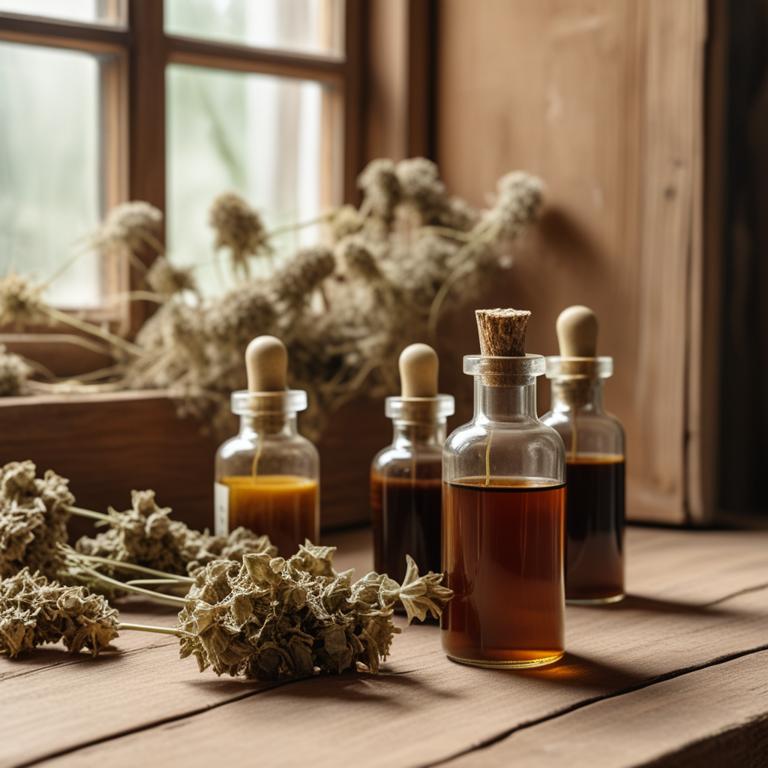
Herbal tinctures for Allergies are liquid extracts made from plants, which are used to treat various allergy symptoms such as congestion, itching, and sneezing.
These herbal remedies offer numerous benefits, including their natural and non-addictive properties, as well as their ability to provide long-lasting relief from allergy symptoms.
Some examples of herbal tinctures used to treat allergies include nettle root tincture, which helps to reduce inflammation and itching, while eyebright tincture helps to alleviate eye and sinus congestion.
Other herbal tinctures, such as butterbur tincture, stinging nettle tincture, and cayenne pepper tincture, are also effective in treating allergies due to their anti-inflammatory and decongestant properties.
According to "Anti-inflammatory & anti-allergy agents in medicinal chemistry", tinctures for allergies can be effective and safe alternatives to traditional antiallergic agents, as certain herbs such as Azadirachta indica, Aloe vera, and Tinospora cordifolia have been reported to exhibit anti-histaminic and antiallergic properties.
Below there's a list of the 13 best herbal tinctures for allergies.
- 1. Urtica dioica tinctures
- 2. Echinacea purpurea tinctures
- 3. Quercus robur tinctures
- 4. Quercus alba tinctures
- 5. Eucalyptus globulus tinctures
- 6. Fagus sylvatica tinctures
- 7. Petasites hybridus tinctures
- 8. Petasites officinalis tinctures
- 9. Verbascum thapsus tinctures
- 10. Olea europaea tinctures
- 11. Ginkgo biloba tinctures
- 12. Curcuma longa tinctures
- 13. Zingiber officinale tinctures
Also you may be interested in...
TODAY'S FREE BOUNDLE
Herb Drying Checklist + Herbal Tea Shopping List + Medicinal Herbs Flashcards
Enter you best email address below to receive this bundle (3 product valued $19.95) for FREE + exclusive access to The Aphotecary Letter.
$19.95 -> $0.00
1. Urtica dioica tinctures
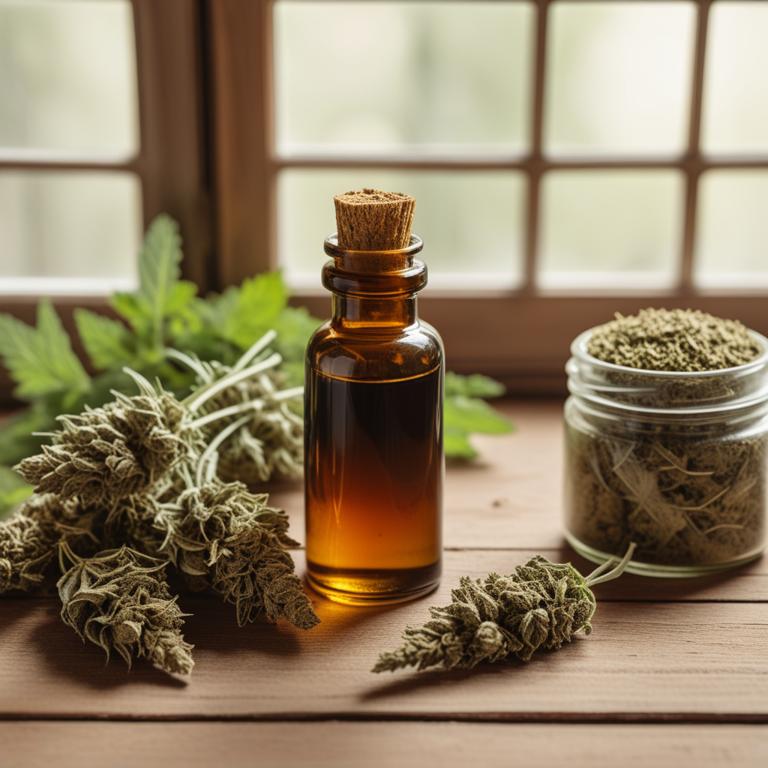
Urtica dioica tinctures, derived from the leaves and stems of the stinging nettle plant, are a natural remedy for treating allergies due to their anti-inflammatory and antihistamine properties.
The bioactive constituents, including flavonoids, alkaloids, and lectins, help to reduce histamine release, alleviate symptoms, and promote immune system balance.
By inhibiting the release of histamine and other inflammatory mediators, Urtica dioica tinctures help to alleviate symptoms such as itching, sneezing, and congestion associated with allergies.
Regular use of Urtica dioica tinctures can provide long-term benefits, including reduced sensitivity to allergens, improved immune function, and enhanced overall well-being.
Related Study
According to "Pharmaceutical biology", Urtica dioica tinctures for allergies may be effective in reducing inflammation and oxidative stress, as evidenced by a 60% decrease in eosinophilia in bronchoalveolar lavage fluid (BALF) and a 48.58% decrease in lipid peroxidation in lung tissue.
2. Echinacea purpurea tinctures

Echinacea purpurea tinctures have been traditionally used to treat allergies due to their immunomodulatory and anti-inflammatory properties.
These properties help to modulate the immune system's response to allergens, thereby reducing the severity of allergic reactions.
The bioactive constituents, including alkylamides, glycosides, and phenolic acids, in Echinacea purpurea tinctures are responsible for its therapeutic effects, which help to alleviate symptoms such as congestion, sneezing, and itchy eyes.
Regular use of Echinacea purpurea tinctures can provide benefits in reducing the frequency and severity of allergic episodes, promoting overall respiratory health and well-being.
Related Study
According to "The Cochrane database of systematic reviews", Echinacea purpurea tinctures for allergies may be beneficial as some preparations containing Echinacea extracts were found to be better than a placebo, but the available evidence is not sufficient to recommend a specific product or preparation.
3. Quercus robur tinctures
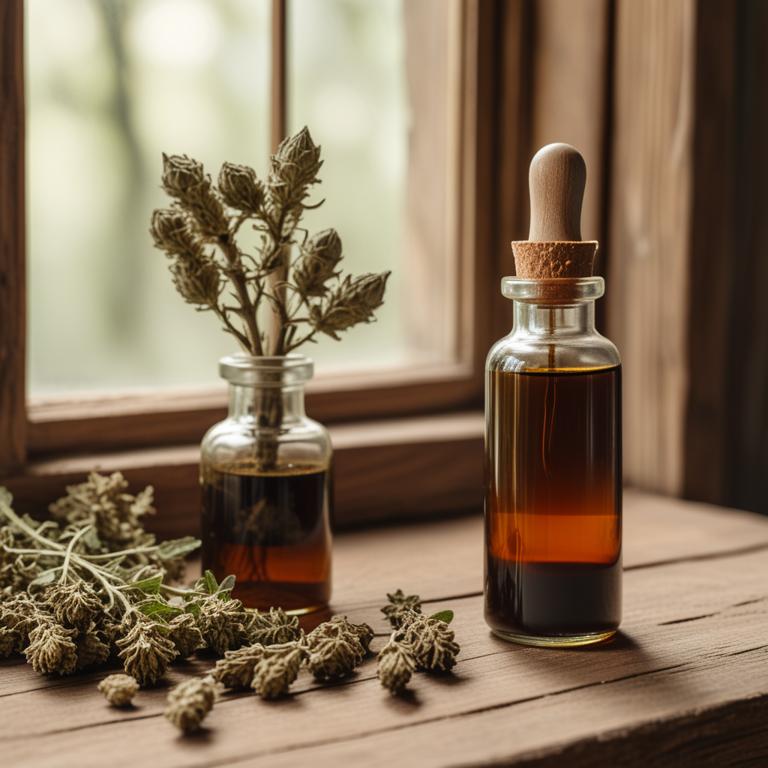
Quercus robur tinctures have been traditionally used to treat allergies due to their anti-inflammatory and antihistamine properties, which help to reduce symptoms such as congestion, itching, and sneezing.
The bioactive constituents of Quercus robur tinctures, including flavonoids, phenolic acids, and tannins, work together to inhibit the release of histamine and other chemical mediators that contribute to allergic reactions.
By using Quercus robur tinctures, individuals can experience relief from allergy symptoms, including reduced inflammation and improved respiratory function.
The benefits of Quercus robur tinctures in treating allergies include a natural and non-pharmacological approach to managing symptoms, with minimal side effects and no risk of dependency or addiction.
4. Quercus alba tinctures

Quercus alba tinctures, derived from the white oak tree, have been traditionally used to treat allergies due to their anti-inflammatory and antihistamine properties.
The bioactive constituents present in Quercus alba tinctures, including flavonoids and phenolic acids, help to reduce inflammation and alleviate allergic reactions.
By inhibiting the release of histamine and other chemical mediators, Quercus alba tinctures can help to alleviate symptoms associated with allergies, such as itching, sneezing, and congestion.
The benefits of using Quercus alba tinctures to treat allergies include reduced reliance on conventional medications and a more natural approach to managing symptoms.
5. Eucalyptus globulus tinctures
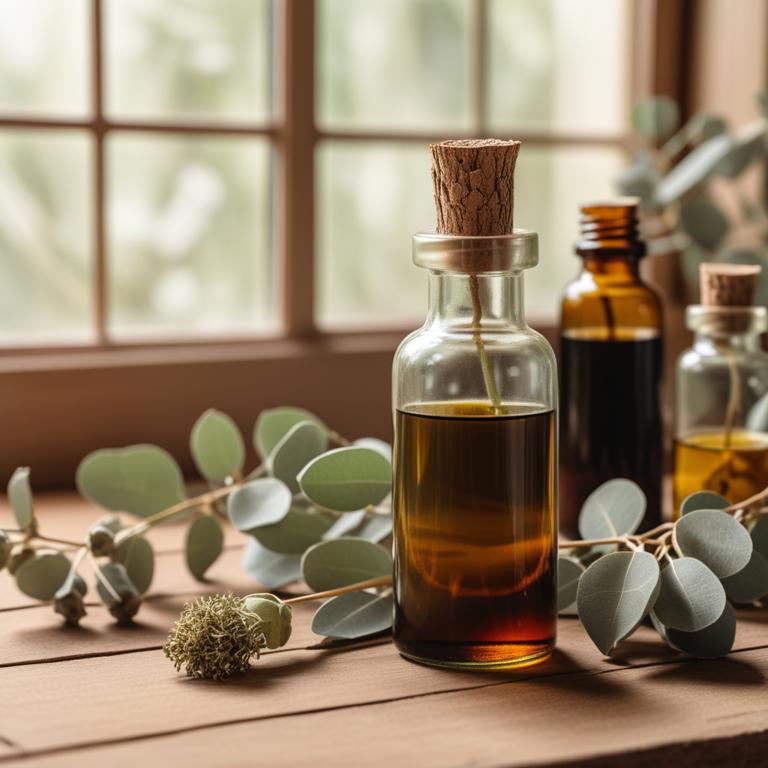
Eucalyptus globulus tinctures have been traditionally used to treat allergy symptoms due to their anti-inflammatory and decongestant properties, which help to alleviate congestion, itching, and sneezing.
The bioactive constituents, including eucalyptol and limonene, in this herbal preparation help to reduce inflammation and relieve respiratory issues.
By acting as a bronchodilator, Eucalyptus globulus tinctures help to open up airways, making it easier to breathe and alleviate allergy symptoms such as runny nose and itchy eyes.
The benefits of using Eucalyptus globulus tinctures to treat allergies include reduced symptoms, improved respiratory function, and a decrease in the need for over-the-counter medications.
Related Study
According to "The Journal of asthma : official journal of the Association for the Care of Asthma", Eucalyptus globulus tinctures for allergies may have a positive effect on symptoms such as rhinorrhea, sneezing, and itching, similar to allopathic medicines used to treat allergic rhinitis.
6. Fagus sylvatica tinctures

Fagus sylvatica tinctures have been used in traditional medicine to treat allergies, leveraging their anti-inflammatory and antihistamine properties.
The bioactive constituents, including flavonoids and phenolic acids, help to reduce histamine release and alleviate symptoms associated with allergic reactions.
By modulating the immune response and reducing inflammation, Fagus sylvatica tinctures can provide relief from respiratory issues, skin rashes, and other allergy-related symptoms.
Regular use of Fagus sylvatica tinctures may also offer long-term benefits, such as reduced sensitivity to allergens and improved overall well-being.
7. Petasites hybridus tinctures
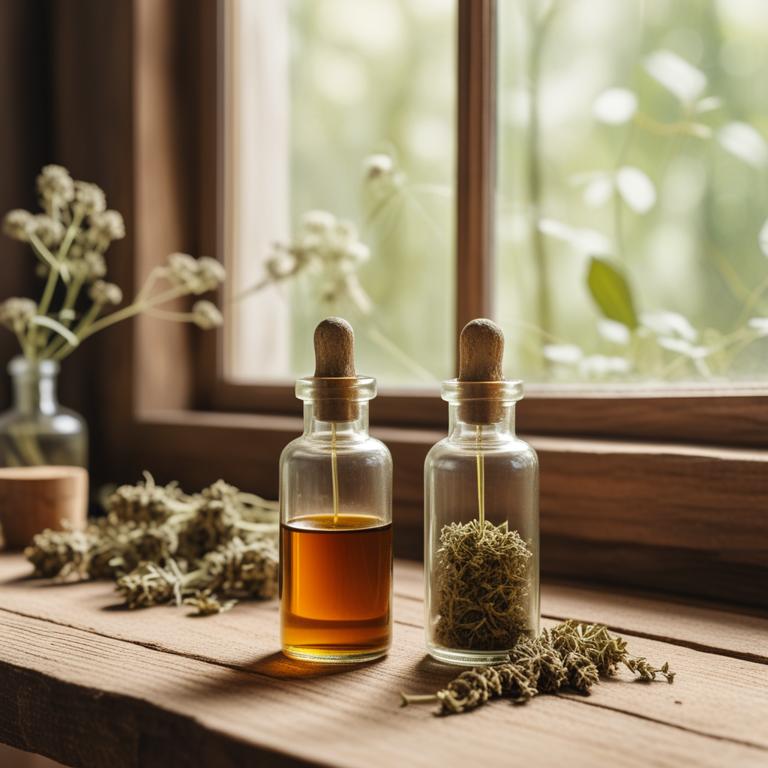
Petasites hybridus tinctures are a natural remedy used to treat allergies, particularly those caused by histamine release.
The anti-inflammatory and antihistamine properties of this herbal preparation help to alleviate symptoms such as itching, sneezing, and congestion.
The bioactive constituents, including sesquiterpenes and flavonoids, have been shown to inhibit the production of inflammatory mediators, providing relief from allergy-related discomfort.
By reducing inflammation and modulating the immune response, Petasites hybridus tinctures offer a beneficial treatment option for individuals suffering from allergies, promoting a sense of relief and well-being.
Related Study
According to "PloS one", Petasites hybridus tinctures for allergies may improve overall total nasal symptoms, especially nasal congestion and sneezing, and rhinoconjunctivitis quality of life scores.
8. Petasites officinalis tinctures

Petasites officinalis tinctures have been traditionally used to treat various allergy symptoms, including hay fever and sinusitis, due to their anti-inflammatory and antihistamine properties.
These tinctures contain bioactive constituents such as sesquiterpenes, flavonoids, and saponins, which help to reduce inflammation and prevent the release of histamine, thereby alleviating symptoms like congestion, itching, and sneezing.
The benefits of using Petasites officinalis tinctures for allergy treatment include their ability to provide fast relief, reduce reliance on conventional medications, and promote overall well-being.
By inhibiting the production of histamine and other chemical mediators, Petasites officinalis tinctures can effectively mitigate allergy symptoms and improve quality of life for individuals suffering from these conditions.
9. Verbascum thapsus tinctures
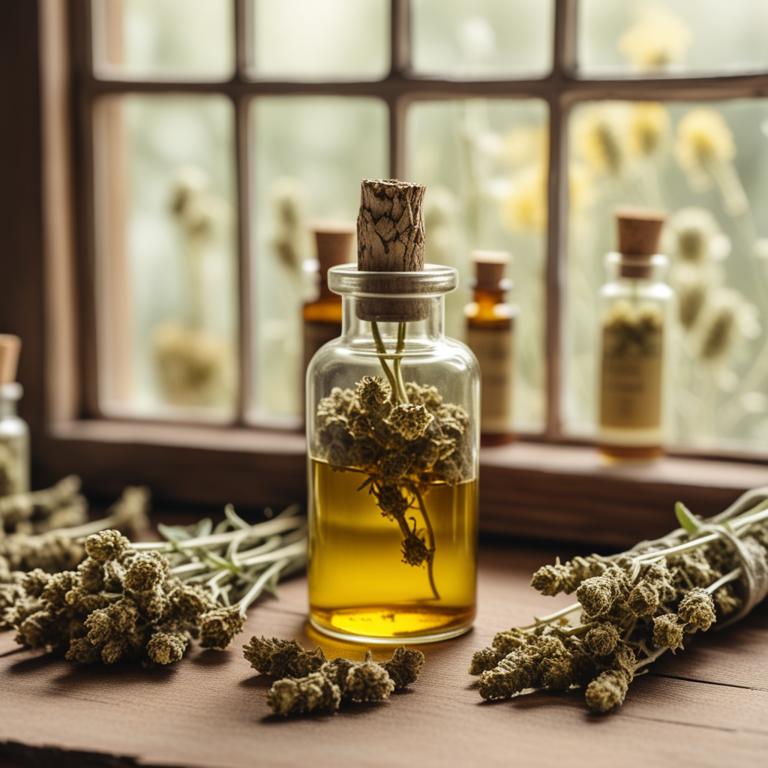
Verbascum thapsus tinctures are herbal preparations made from the flowering plant Verbascum thapsus, commonly known as mullein, which has been traditionally used to treat allergic reactions.
The anti-inflammatory and antihistamine properties of this herbal preparation help to alleviate symptoms of allergies, such as itching, sneezing, and congestion, by reducing the release of histamine and other chemical mediators.
The bioactive constituents of Verbascum thapsus tinctures, including flavonoids, phenolic acids, and saponins, contribute to its therapeutic effects by modulating the immune system and reducing inflammation.
The benefits of using Verbascum thapsus tinctures to treat allergies include reduced symptoms, improved respiratory function, and enhanced overall well-being, making it a popular natural remedy for those seeking a holistic approach to managing allergies.
Related Study
According to "Turkish archives of otorhinolaryngology", Verbascum thapsus tinctures, as part of the Sinulan forte preparation, have been found to be a safe and effective treatment for acute postviral rhinosinusitis, with no adverse effects reported in the study.
10. Olea europaea tinctures
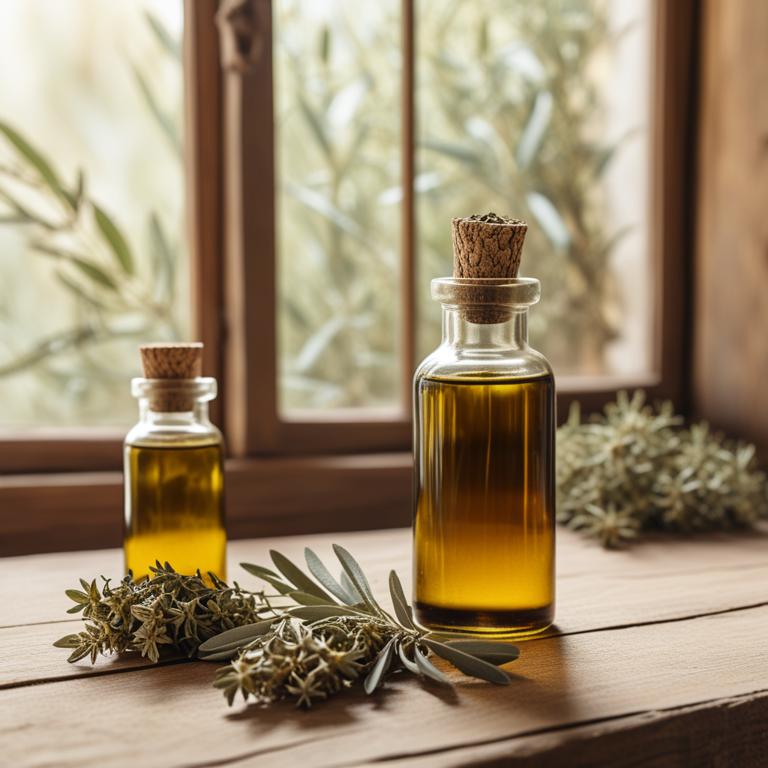
Olea europaea tinctures, derived from the leaves of the olive tree, have been used to treat allergies by exhibiting anti-inflammatory and antihistamine properties that help to alleviate symptoms such as itching, sneezing, and congestion.
The tinctures contain bioactive constituents like oleuropein, which helps to reduce inflammation and modulate the immune response, thereby alleviating allergy symptoms.
By reducing histamine release and inhibiting the expression of pro-inflammatory genes, Olea europaea tinctures help to treat allergies by providing relief from symptoms and promoting a balanced immune response.
The benefits of using Olea europaea tinctures to treat allergies include reduced reliance on conventional medications, improved immune function, and enhanced overall well-being.
Related Study
According to "The Journal of asthma : official journal of the Association for the Care of Asthma", Olea europaea tinctures may have positive effects on allergies, such as antagonism of asthma mediators like histamine and improved symptoms in patients with allergic rhinitis.
11. Ginkgo biloba tinctures

Ginkgo biloba tinctures are a natural herbal preparation that has been traditionally used to treat various health conditions, including allergies.
The properties of this herbal preparation that help to treat allergies include its anti-inflammatory and antioxidant effects, which can help to reduce the severity of allergic reactions and alleviate symptoms such as itching, sneezing, and congestion.
The bioactive constituents of Ginkgo biloba, including flavonoids, terpenoids, and bilobalide, help to block the release of histamine and other chemical mediators that contribute to allergic responses, thus providing relief from symptoms.
The benefits of using Ginkgo biloba tinctures to treat allergies include reduced reliance on pharmaceutical medications, minimal side effects, and improved overall well-being.
12. Curcuma longa tinctures

Curcuma longa tinctures have been traditionally used to treat allergies due to their anti-inflammatory and antioxidant properties, which help to reduce the severity of allergic reactions.
The bioactive constituents of Curcuma longa, including curcumin, demethoxycurcumin, and bisdemethoxycurcumin, have been shown to inhibit the production of inflammatory cytokines and enzymes, thereby reducing the symptoms of allergies such as itching, sneezing, and congestion.
By modulating the immune response and reducing inflammation, Curcuma longa tinctures can provide relief from seasonal allergies, food allergies, and skin allergies.
The benefits of using Curcuma longa tinctures to treat allergies include reduced symptoms, improved quality of life, and a natural alternative to conventional medications.
Related Study
According to the study on the nutritional profile of minerals and antioxidants in Indian spice extracts, Curcuma longa tinctures may be effective for allergies due to its high concentration of antioxidants and inhibitory action against most bacterial strains.
13. Zingiber officinale tinctures

Zingiber officinale tinctures have been traditionally used to treat allergies due to their anti-inflammatory, antihistamine, and immunomodulatory properties, which help to alleviate symptoms such as itching, sneezing, and congestion.
The bioactive constituents of Zingiber officinale, including gingerols and shogaols, exhibit their therapeutic effects by inhibiting the release of histamine and other pro-inflammatory mediators from mast cells, thereby reducing the severity of allergic reactions.
The benefits of using Zingiber officinale tinctures to treat allergies include their ability to reduce inflammation, improve respiratory function, and enhance overall well-being, making them a popular natural remedy for seasonal and chronic allergies.
By incorporating Zingiber officinale tinctures into their treatment regimen, individuals can experience relief from allergy symptoms and enjoy a healthier, more comfortable quality of life.
Related Study
According to the study, Zingiber officinale tinctures show potential as adjuvant symptomatic therapy in respiratory conditions, suggesting a possible benefit in treating allergy-related respiratory issues.